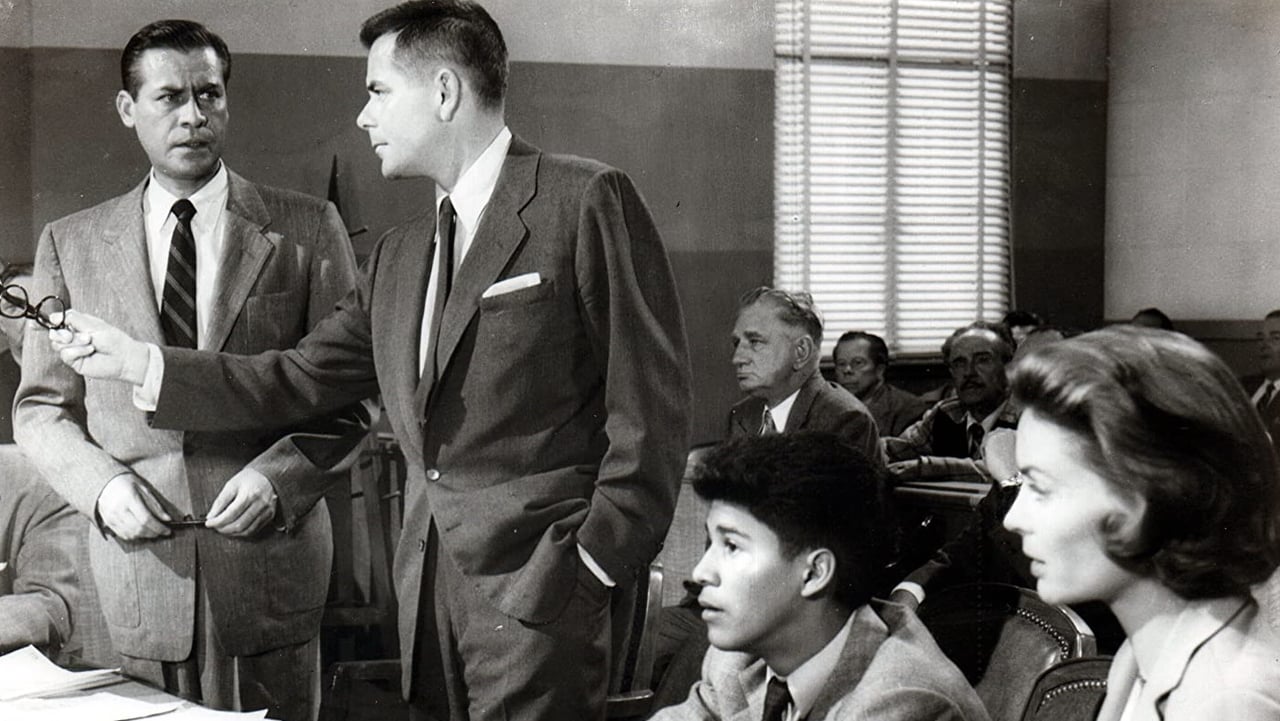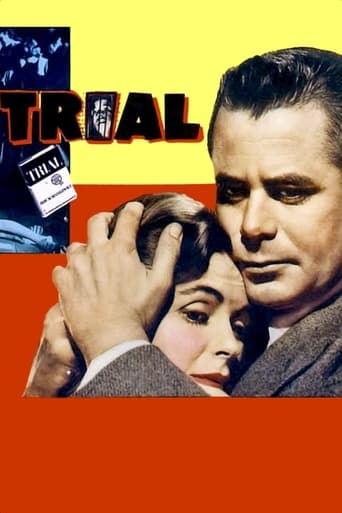

Glenn Ford, a law professor, carries about a cigarette lighter with a Latin inscription that translates as "Where there is a wrong, there is a remedy." Here we see that the application of the remedy can lead to an iatrogenic disease.Poor, young, Mexican, Rafael Campos, is found standing over the dead body of a young girl on the beach. The girl has suffered from rheumatic fever and has died, in the opinion of the medical examiner, from heart failure induced by violent exertion. The consensus is that Campos had been pursuing her with rape on his mind and that this is therefore a case of felony murder.The loud-mouthed bigots of San Juno are organized and they and their leader intrude on the quiet funeral ceremony of the dead girl, forcing the Padre to say two blessings, one before and one after their rabble-rousing racist pronouncements.Later, they form a mob in front of the jail and assault the iron gate, trying to break it down in order to lynch Campos. The sheriff doesn't have enough men to prevent them but he talks the hoi polloi out of it anyway for reasons of political advantage. He doesn't care about the kid but he wants to be reelected.So far, so humdrum.A minority kid is about to be railroaded into the slams for an alleged sex crime and barely escapes murder by an aroused crowd of white zealots. We've seen it all before.We even anticipate it when Glenn Ford is drawn into the case under the auspices of the Libbo lawyer Arthur Kennedy, and we anticipate too that while Kennedy is out scraping together enough money to fund the defense, Ford -- in his first trial -- will get the kid off, maybe with some other guilty party breaking down on the stand and sobbing, "I DID it. I DID IT! But I only meant to scare her." Not this time.As one of the "good guys", the smirking Arthur Kennedy, in his villainous mode, is immediately jarring to our seasoned sensibilities. In his first meeting with the defendant and his family, he shoves the hysterical mother around and whacks Campos across the face to force him to admit that he tried to rape the girl, while innocent Glenn Ford stands aghast.It isn't long before we learn that Kennedy is a communist and is using Rafael Campos to generate a lot of cash -- only some of which will go the defense fund, while the rest winds up in the pockets of the party. Not only is Kennedy a commie, he also pronounces the defendants name with the wrong initial phoneme -- Shh, instead of Tch -- as if it were a French verb in the second person.By the end of the trial, the Communist Party line has changed. They no longer want to get Campos off. They've decided that he'd be more useful as a martyr, so Kennedy does everything he can to sabotage the defense -- firing Ford (who was about to win the case) and disrupting the court by calling the judge, reliable old Juano Hernandez, a "handkerchief head" and an "Uncle Tom." The judge is pretty savvy, however, and by this time Ford has wised up enough to save the kid from the guillotine, but not from prison.The plot is as disjointed as hell. It wanders all over the place, poking into narrative corners, dwelling too long on incidental characters like the sheriff and the victim's family and the defendant's mother.But, in its own, somewhat obstreperous way, it's more challenging than most of the courtroom dramas that wind up on film. It shouldn't have been called "Trial" because the focus here is chiefly on what goes on behind the scenes, after court is adjourned. The extremists on both sides have a spotlight turned on them and they enjoy it. And the film raises questions that the usual formula does not. Not everyone on the "good" side is respectable. The money is shady, raised from people under deceptive circumstances. Should it be used, even if it's "bad" money? When Ford demurs, Kennedy replies with a question: What would you rather have? Fifty thousand dollars for a defense fund or one hundred and six? Good question too. Suppose a convincingly innocent-looking Muslim is on trial for some terrorist act. Should the defense accept funds from some Jihadist organization? Would it be better to shun such money and have the defendant convicted? Tough ethical stuff.The film is weakened by overacting. That's Mark Robson, the director. He's in charge of such things. And some viewers might be put off by the lack of the usual Manichaean divide between black and white, the absence of clear good and evil, a feature that I think is the movie's main virtue. What I mean is that it's not reassuring. It prompts us to think, to question our conception of the justice system, to wonder about our beliefs. That's an irritant. As Charles Sanders Peirce said, "Belief is thought -- at rest."
... View MoreThis film fascinates precisely BECAUSE of its confused treatment of the theme of bigotry. It does not only refer, under a thin disguise of name, to Senator McCarthy - but also to the Ku Klux Klan. To me, its chief value is that it illustrates rather startlingly the ethical strangeness of a mid-fifties America apparently seeking a definition of justice while still beset with considerable self-doubt concerning its own institutions.Few films of the period make so explicit the names of the antagonists; that is what sets it apart.On the level of pure melodrama, it is entertaining, fast-paced and convincingly acted. The opening scene suggests an erotically-charged no man's land, namely the beach community of San Juno, anno 1947. This is the scene that I think will remain in my memory, because it precedes all the rhetoric, legalistic and otherwise, which never quite connects with the reality of spontaneous behaviour - simply, groping in the dark.
... View MoreTrial is a movie that begs for a re-make, but in the current climate of political correctness, it is a story that cannot be told today. The Left Wing writers and actors that populate Hollywood would never allow that. This story was perfect for its time. Although it ostensibly is about the trial of a young Hispanic boy, it tells the tale of how activist groups twist and turn the laws and the people of the US in such circles that people come to believe that wrong is right. The bad guys were the Communists in this movie, but they have been defeated... or have they? Watch this movie and instead of the Communists, slip in the names of other prominent modern Leftist groups and you'll see that the story is not as dated as it looks.
... View MoreThis movie just seems to take on too much and it just doesn't work. It stars out with Glenn Ford working as a law professor who is about to be fired unless he gets some actual trial experience. He goes to several different lawyers but is turned down until he runs into Arthur Kennedy. Dorothy McGuire is his assistant and begins a relationship with Ford. They get a young Mexican boy accused of murdering a white girl as a client and Ford and Kennedy seem to be going in different directions on the case. Ford actually wants to save the boy but Kennedy just wants to raise money and make a martyr out of him but he can't do that unless the boy is found guilty. They even bring up communism in here and it just seems they bring up too much in not enough time.
... View More